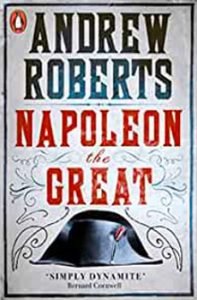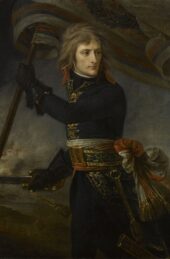Six of the Best: Books on Napoleon
With Ridley Scott’s new movie, Napoleon, out soon and starring Joaquin Phoenix as Bonaparte and Vanessa Kirby as Josephine, much discussion has been prompted over its historical accuracy. If your interest is peaked then you must check out these six books on the Corsican Ogre/Greatest Frenchman (delete as appropriate). Scott has caused much consternation among historians who have taken his comments to heart, so if you want to find out the truth, or their truth, you could do worse than one, or all, of the following titles that cover so many aspects of his extraordinary life.
Napoleon the Great, Andrew Roberts
‘Fighting is a soldier’s religion’ said Napoleon and he was first and foremost a soldier. If Andrew Roberts’ Napoleon & Wellington was an enjoyable read for the two great commanders who only met in battle once but never met, with Nosey the victor thereby ensuring his greatness in Britain forever, then perhaps it’s a surprise to read Roberts so enthusiastic about Napoleon in making his demand that he be known as ‘Great’. Whilst positive this is no hagiography, and if you’re looking for an all-encompassing biography then this should be your start. Napoleon was both a brilliant general and ruler, not something the Duke could claim. The descriptions of the various conquests are thrilling, and in Napoleon the Great we understand exactly why he is important to modern day Europe.
Napoleon: A Life in Gardens & Shadows, Ruth Scurr
Did you know Napoleon was fascinated by horticulture from a young age? Ruth Scurr has written an incredibly moving and original biography focussing on how nature was important to him in providing order in a life that saw the chaos of the French Revolution, countless bloody battles of carnage and ultimate disaster then solitude in the middle of the Atlantic. As Ridley reminded us there have been many books written, but it’s quite an achievement to produce a work in 2021 that really does break new ground – we are taken to the gardens of his youth in Corsica to Paris, Malmaison, Egypt and even to the walled garden at Hougoumont, Waterloo and finally his St. Helena exile arranging plants much as he did troops on countless battlefields.
1812: Napoleon’s Fatal March on Moscow, Adam Zamoyski
The march into Russia is well-known to be Napoleon’s greatest blunder, but Adam Zamoyski’s 2004 1812 is rare for its exhaustive description of the disaster using diaries and accounts of the army from Croats, Dutch, Prussians, Poles, Spaniards and Italians as well as French and Russians. Zamoyski’s narrative grips you as he describes the freezing winter conditions, with the summers no better as the sun beat down on troops marching in collapsing footware, thick woollen coats and all the time attacked by swarms of ravenous horse-flies. Napoleon was not at his best for this campaign, most notably with costly mistakes at Borodino, but the reader can understand his rage at subordinates incapable of reaching his own grand heights. A remarkable book.
Josephine, Kate Williams
Biographies of the great commander Napoleon naturally attract male historians, but to understand the man you have to understand the woman he loved, and in Kate Williams’ Josephine we get the female perspective in a gorgeous biography. Josephine was glamourous, skilled in diplomacy and utterly charming. One can see why the two were captivated, though this is no male dominated relationship – one only has to read of their wedding night when Josephine’s pug won an important victory over Bonaparte and secured the first night alone with her.
Napoleon in Egypt, Paul Strathern
When Napoleon arrived in Egypt aged only 28 he had dreams of emulating Alexander the Great, crossing Asia to reach India, and to bring the enlightenment and western civilisation to the ancient land. Nelson thwarted his ambitions by defeating his navy at the Nile, not for the first time, and so when he left his army had suffered defeat, he was confined to Egypt and it was his legion of scientists and artists that had been educated. Paul Strathern’s account of the ultimately disastrous adventure is a thrilling read and once you’ve read this, your eyebrow will be raised at Ridley Scott’s reason for Bonaparte’s departure.
Black Spartacus, Sudhir Hazeerasingh
The impression one gets from many sympathetic to Napoleon was that he was, in some way, an island of progressivism among a sea of reactionaries. Leaving aside the fact he crowned himself emperor, his re-imposition of slavery on the island of Haiti, and his disgraceful treatment of the great Toussaint Louverture certainly leave major question marks over his legacy. In Sudhir Hazeerasingh’s wonderful Black Spartacus, we see the Haitian Revolution through the eyes of the oppressed, as they go up against the mighty European powers of Spain, Britain and France – and win, even if eventual defeat led to a sad end for Louverture in Napoleonic France.
…and for some historical fiction
Sharpe’s Waterloo, Bernard Cornwell
Fans of Richard Sharpe will know he met Napoleon while travelling to South America in Sharpe’s Devil, but at Waterloo Cornwell describes the battle brilliantly as Sharpe and Harper move around the Allied lines as they faced the French army for the ultimate showdown between Wellington and Bonaparte. Boney came off second best and he underestimated the Duke, and perhaps more importantly the discipline and accuracy of the British volley fire as they wreaked havoc on his beloved Imperial Guard. Napoleon is present but does not appear and Cornwell manages convey the sense of awe he inspired in his opponents, let alone in his own devoted troops.













